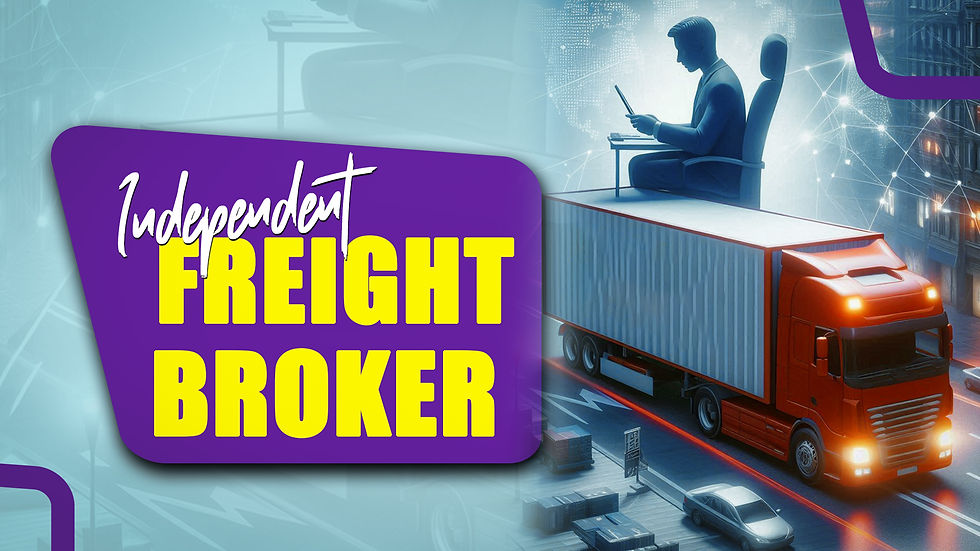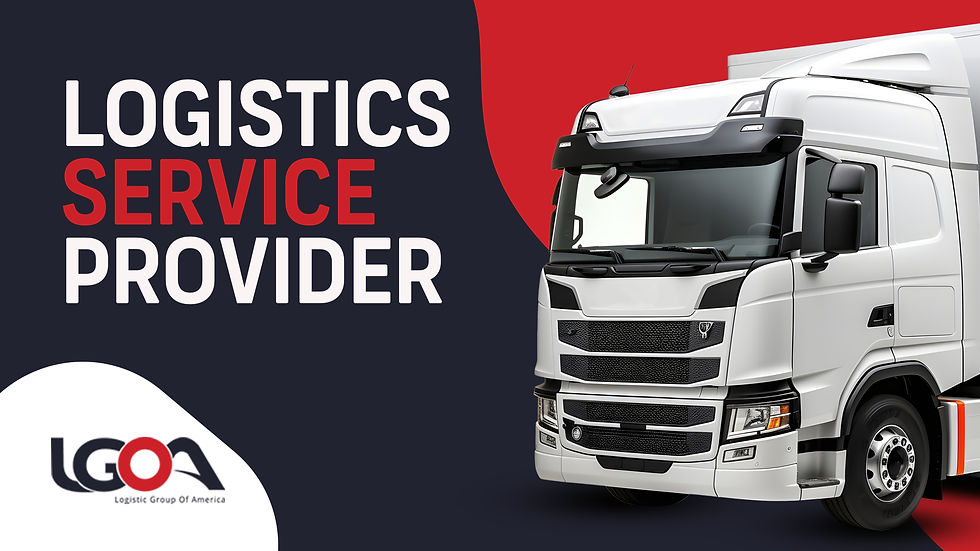How to Start as an Independent Freight Broker in 2025
- Logistic Group America
- Nov 7, 2024
- 4 min read
The freight brokerage is an integral component of the global supply chain in which a link connects shippers directly to carriers to help the frictionless movement of goods. Given the constant growth in e-commerce and logistics, an independent freight brokerage can be a very fulfilling career. Here is the guide with all the necessary steps and insights of the industry that will help you as a freight broker succeed in 2025.

1. Learn the Role of Freight Broker
A freight broker associates with the shippers, who have cargo to be transported by the carriers. Independent freight brokers organize and arrange for cargo movement, ensuring that the goods reach their destinations on time at the best price. Very good communication and negotiation skills are required, but it is a flexible and scalable career.
2. Look at Market and Industry Trends
To win, you should know about the freight industry specifically any changes that are to be expected this 2025. The main trends affecting the market include:
Increased E-commerce Shipping Demand: The boom in online shopping has transformed logistics and increased the demand for efficient freight brokers.
Sustainability Initiatives: Companies are now looking to use environmentally friendly transportation. A solution that reduces carbon emissions could be a unique selling point.
Technological Advancements: Freight technology is becoming increasingly sophisticated. AI-based logistics planning, optimized routes through automated systems, and real-time tracking are current norms. Learn them to stay ahead in the race.
3. Acquire the Required Education and Training
Additionally, no specific educational requirements for freight brokers, but a background in business, logistics, or transportation would be a goldmine. You should consider availing of Freight Brokerage training programs to get industry-specific knowledge that includes topics like the following:
Freight regulations and compliance
Carry relationships and negotiations
Pricing and contracts
Freight management software
It helps you to understand industry nuances, making it easy to ride the waves once the brokerage starts.
4. Get a License and Insurance
Independent freight brokers in the United States need to get a Motor Carrier number from the Federal Motor Carrier Safety Administration. Application guidelines can be found here
Submit the OP-1 Application for Motor Property Carrier and Broker Authority at the FMCSA's webpage.
Pay about $300 to apply.
Be prepared for processing time differently each day, though it may take about 20-25 business days.
Also, you would require a surety bond or trust fund agreement with at least $75,000 to demonstrate financial responsibility in your business operations. It is prudent to study insurance options to cover liability, cargo loss, and other possible risks in order to maintain the safety of keeping your operations on the ground.
5. Right Technology and Tools
Technology can be a mighty tool to manage your operations in a brokerage. Many freight brokers make heavy use of transportation management systems (TMS) to smooth out some of the processes in such areas as load tracking, rate negotiations, and just overall document handling. For new brokers, some of the TMS options are:
Truckstop.com and DAT: This is a load board where you post your freight and find carriers.
Freight brokerage CRM software: This manages all interaction and interactions with clients and improves customer service.
Accounting tool: track payment, manage invoices, and keep the books organized
Stay organized from the beginning to save time, reduce errors, and help your business appear more professional.
6. Build a Network of Shippers and Carriers
Networking is the way to get the business as an independent freight broker. Attend conferences, participate in freight brokerage associations, and socialize through LinkedIn to reach out to future clients and partners. The more you develop a very reliable carrier network, the more constant the service is delivered to your clients, thus fostering confidence and loyalty.
7. Market Your Freight Brokerage Business
An independent freight broker needs proper marketing to carry his services to interested customers. Some such strategies are:
Website and Branding: Any Website builds your credibility, and people find you online. Clearly outline your services, expertise, and contact information.
Content Marketing: Blog or guide content about your industry solves pain points. Great content builds trust and attracts organic traffic to a website.
Social Media Presence: LinkedIn is fantastic for showcasing your knowledge and connecting with industry peers.
Cold Outreach: Cold calling or emailing clients can be extremely effective. A good pitch highlighting what distinguishes you will normally have calls returned.
8. Provide Great Service and Long-Term Relationship
The success of a freight broker can be defined by efficiency and reliability. It is almost always about a smooth, transparent broker who can help troubleshoot and get the problem out in the open. Any issues that occur must be acted on quickly; constant communication will need to be maintained; and input received to improve.
Happy customers will refer you to others, and thereby grow your business. Also, consider providing incentives for returning business in order to establish long-term relations and ensure a steady inflow of finance.
Conclusion
Starting an independent freight brokerage in 2025 requires a lot of dedication, a sound business plan, and depth knowledge about the industry. It can develop a successful freight brokerage that generates considerable profits if suitable licenses are obtained, technology is used, and outstanding services are provided. As needs for rationalized logistics are increasing day by day, it is a very good time for you to enter the market and create your niche in the freight business under the guidance and expertise of LGOA.




Comments